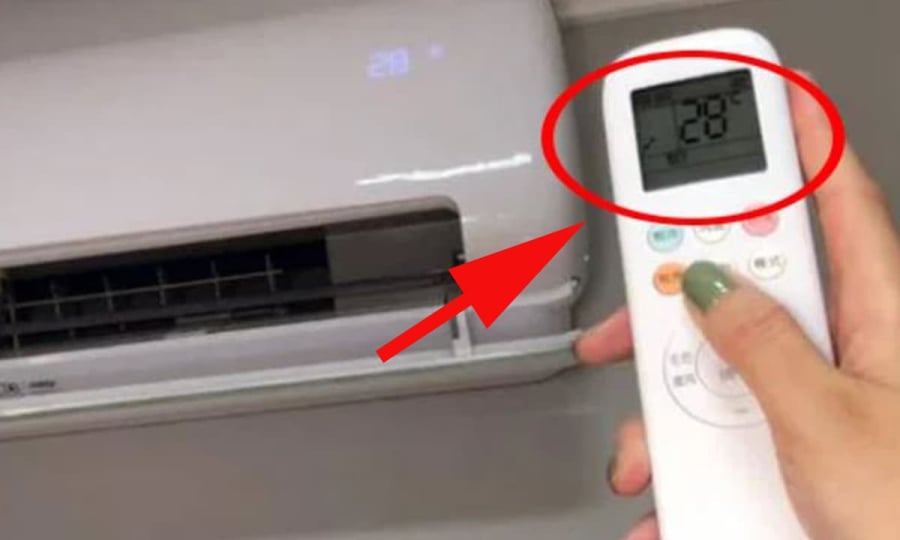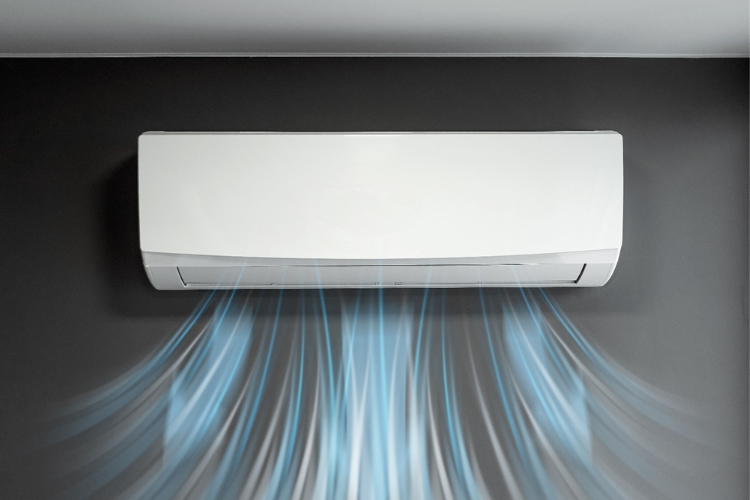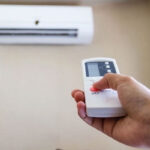28 Degrees Celsius – Ideal Temperature or Wasteful?
While many believe that setting the air conditioner to 28°C is the “golden” choice for energy savings, refrigeration engineers suggest that this may not be entirely accurate in all situations. The most energy-efficient temperature setting depends on factors such as outdoor temperature, as well as the area and insulation capacity of the space being cooled.
According to technical experts from a Japanese electronics company, the ideal indoor temperature should differ from the outdoor temperature by about 6–10°C. For instance, if the outdoor temperature is 36°C, setting the air conditioner to 26–28°C is appropriate. However, if the weather is milder at 30–32°C, setting it to 28°C may cause the air conditioner to operate intermittently, constantly turning on and off, resulting in increased energy consumption.

Why You Shouldn’t Set Your Air Conditioner Too Cold
Some people have the habit of setting their air conditioners to a very low temperature, such as 20–23°C, especially at night, to quickly cool down the room. However, the lower the temperature setting, the harder the machine has to work to maintain the desired temperature, leading to increased energy consumption and potential overload of the outdoor unit.
Additionally, a large temperature difference can negatively impact your health. Common issues include dry skin, nasal congestion, sore throat, and even heat shock when moving from a cold room to a hot outdoor environment.
Medical professionals recommend maintaining an indoor temperature between 25–28°C for optimal comfort and health. This temperature range should be coupled with a relative humidity of 40–60% for the best results.
Combining Fans and Air Conditioners – A Simple Yet Effective Solution
An often-overlooked tip for energy savings is to use fans (ceiling, table, or mist fans) in conjunction with air conditioning. By improving air circulation, fans enable you to set your air conditioner to a higher temperature, such as 27–28°C, while still maintaining a comfortable environment.
This combination not only ensures more uniform cooling but also reduces the strain on the air conditioner. As a result, the compressor doesn’t have to work continuously at high capacity, prolonging the lifespan of the appliance and significantly reducing electricity costs.
Is It Advisable to Leave the Fan On All Night?
It is generally recommended to use a fan at night, especially in hot and humid weather. However, it’s important to maintain proper fan hygiene to prevent the circulation of dust and allergens, which can be harmful to respiratory health, especially for children and the elderly. Additionally, it’s advisable to direct the fan towards a wall or set it to oscillate rather than blowing directly at the body to avoid localized cooling and potential health issues like catching a cold or headaches upon waking up.

Tips for Energy-Efficient Air Conditioner Use
- To optimize the efficiency of your air conditioner, keep the following in mind:
- Close doors and windows when the air conditioner is running to prevent cold air from escaping.
- Clean the air filters regularly (about once a month) to maintain cooling efficiency.
- Avoid frequently turning the air conditioner on and off. Restarting the unit consumes three to five times more energy than keeping it running continuously.
- Utilize “Eco” or “Sleep” modes, if available, to minimize energy consumption during nighttime hours.
- Turn off the air conditioner using the remote control and then cut off the power supply to prevent standby power consumption.
Setting the air conditioner to 28°C can indeed save energy, but only when it aligns with outdoor conditions and is complemented by supportive measures such as using fans, maintaining closed rooms, and regular appliance maintenance. Smart use of air conditioning not only reduces your electricity bills but also safeguards your health and prolongs the lifespan of your cooling equipment.
Should You Turn Off Your Water Heater Before Taking a Bath? The Surprising Truth Revealed.
“Introducing the ultimate guide to understanding this matter inside out. Uncover the secrets to success and learn from the masters with this comprehensive insight. Discover the reasons behind the scenes and the essential considerations to keep in mind. It’s time to elevate your knowledge and become an expert.”
6 Smart Ways to Save on Energy Costs This Summer
Saving electricity during the summer is a concern for many households, but not everyone knows how to use their electrical appliances efficiently. With energy costs soaring and the environmental impact of excessive energy consumption becoming an increasingly pressing issue, it’s crucial to adopt smart habits to reduce electricity usage. This starts with understanding which appliances are energy guzzlers and learning simple yet effective strategies to use them more efficiently. By making small changes to our daily routines and being mindful of our energy usage, we can significantly lower our electricity bills and collectively contribute to a greener planet.





































